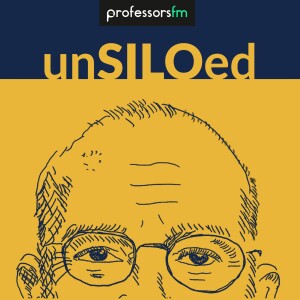
393. Behind the Scenes of Medical Research feat. John Ioannidis
 2024-03-06
2024-03-06
The acceleration of research in science, comes with an increasing number of flawed resultsparticularly in the medical sciences, where misapplied statistical measures and the relentless pursuit of publishing create a breeding ground for Type I errors. What is the role of the humanities in medicine, and what other revelations did the COVID-19 pandemic ultimately reveal?
John Ioannidis is a professor, writer, physician, and researcher who studies scientific research. John and Greg discuss the current state of scientific research and the challenges researchers face, including uncertainty in statistics, the prevalence of flawed findings, and the need for effective hypothesis testing. John also highlights the need for collaboration, transparency, and accuracy in research. John and Greg also explore the intersection of science, politics, and empathy, advocating for a more humane healthcare system that honors the arts and literature.
*unSILOed Podcast is produced by University FM.*
Episode Quotes:How incentives drive scientist
22:19: Incentives are a core feature in driving what we want to get out of science. Scientists are very bright people, very smart, and they will do their best to try to fit whatever orders are given to them. So if they're told, "You need to get extreme, extravagant, extraordinary results," they will come up with them because that's what will allow them to continue doing what they enjoy and what they love. I'm not saying that they're criminals in doing it. They just want to do science and continue to do science. So, we need to find ways that our reward and incentive system is aligned with the expectation not being spectacular but flawed results, but accurate results.
What can medicine learn from A/B testing?
35:34: Medicine could learn a lot from the massive scale that A/B testing is conducted in some other fields, mostly commercial, but pretty effectively. What we have learned from A/B testing is that, first of all, our prior beliefs are not very solid or not very accurate. So if people try to make guesses of what will be effective and what will not, probably they're better than chance, but not much better than chance.
Science vs. politics
01:01:49: Scientists are not trained to be politicians. They're not trained to be taming beasts, and it's a very different job. And it's very unfortunate when people who are those who tame beasts and are in the political sphere, instead of trying to find ways to bridge divides and close differences, find a way to have a societal response that is more understanding and more empathy, sympathy, and love for each other. It leads to just a split and division and even situations of disruption in a sense of the social fabric.
Is science self-contained?
01:07:17: Sometimes we tend to think that science is self-contained, but science is about humans, especially medicine; it is about humans who suffer, have emotions, have beliefs, and face big dilemmas in their life and in their deaths. And I don't think that you can answer all of that just with either equations, biological samples, or with very fancy analytical methods. We need something more than that to struggle with our inadequacy. I feel very inadequate all the time, just trying to cover that inadequacy as much as I can.
Show Links:Recommended Resources:
- Ronald Fisher
- P-value
- P-hacking
- Replication crisis
- Daryl Bem
- Bayesian statistics
- Infection fatality ratio and case fatality ratio
- Operation Warp Speed
- Manhattan Project
- William Carlos Williams
- John Keats
Guest Profile:
- Faculty Profile at Stanford Medicine
- Faculty Profile at Stanford University
- Wikipedia Page
His Work:
- Google Scholar Page
More Episodes
 2022-11-23
2022-11-23
Create your
podcast in
minutes
- Full-featured podcast site
- Unlimited storage and bandwidth
- Comprehensive podcast stats
- Distribute to Apple Podcasts, Spotify, and more
- Make money with your podcast
It is Free
- Privacy Policy
- Cookie Policy
- Terms of Use
- Consent Preferences
- Copyright © 2015-2024 Podbean.com





